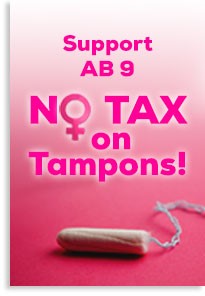 Photo Source: Bustle.com
Photo Source: Bustle.com One subject all women can connect on is their periods. We must face the cramps, mood swings, bloating, and all the annoying hassles of it once a month. But what most people don’t realize about periods is how expensive they can be. “On average, women in California pay about $7 per month for 40 years on tampons and sanitary napkins” For financially struggling women, these costs add up and period products can become unsustainable. Tampons and pads, unlike many gender specific products, also have added sales tax. In California, the tax on these products amount to more than $20 million annually.
Should women be taxed for their biology? The “tampon” tax makes being a woman more expensive. Meanwhile, states have been lifting the sales tax on other “medically necessary” products like Viagra and Rogaine. Why should those products be exempt from sales tax while menstrual products are not? Having a period is not a choice for women but using Viagra or Rogaine for men is. Is there something wrong with this picture? It appears sexist to exempt male products from tax while having women pay tax on menstrual products.
The Tampon tax has become a heavily debated issue as women try to fight for their right to cheaper menstrual products. Several states including Maryland, Massachusetts, and New Jersey, have successfully passed bills to eliminate taxes on pads and tampons. This leads me to wonder how these states eliminated the tampon tax. The common thread for all of these states was their views on menstrual products. They argued that feminine hygiene products should be treated like other medical items that are already exempt from taxes.
Several of these states also had creative and innovative ideas along with real evidence that helped to pass their bills. Connecticut was able to cut their Tampon Tax as a part of their budget implementation bill. New York, the newest state to exempt taxes on menstrual products, was actually served with a lawsuit from five women arguing that the tax on tampons was sexist and unconstitutional. This lawsuit motivated New York legislators to push the bill through. Those opposing these bills have argued that our economy would suffer without the tax revenue from feminine hygiene products. But, states like Connecticut and New York prove that the revenue generated had no negative impact on their government services. If we want to get rid of the Tampon Tax for the country, we need to get vocal and creative. The New York lawsuit proves how important every woman’s’ voice is in the fight to end taxes on menstrual products
California has jumped on the bandwagon to end the sexist tampon tax and recently tried to pass a bill on it. Assemblywoman Lorena Gonzalez Fletcher and Cristina Garcia proposed bill AB479 which would eliminate California’s sales tax on feminine hygiene products. Teala Schaff, Deputy Director of External Affairs & Communications at the California Department of Technology, worked on the California tampon tax. Schaff believes that the root of the problem people face with the tampon tax is that “there remains a persistent taboo in society to speak freely of most biological functions of the human body, let alone the female body, so having frank discussions about the topic makes a lot of people uncomfortable.” Not only is there an issue with discussing the topic but also the fiscal side to the tax issue. Unfortunately, Governor Jerry Brown vetoed this proposed bill last year claiming that this loss in tax revenue would hurt the state’s income.
In recent months, this bill has resurfaced with a new proposed plan to eliminate tax on feminine hygiene products and replace this money with a new higher tax on hard alcohol. Schaff and the other members working on the new bill are not giving up “because equality shouldn’t have a price tag. Women shouldn’t be taxed for being women.” The bill is currently awaiting a decision as discussions continue with Governor Brown. According to Schaff, the Governor can “ “blue line” the bill into his budget.” Schaff further explained that “This means, it can be written into his final version of the budget via a trailer bill by the end of this legislative session which is September 15.”
There is another beacon of hope for California in the fight for menstrual product equality. A bill, also written by Cristina Garcia, was proposed to have free tampons for all public-school restrooms. Although it would not be cutting down on the price for all Californians it would be a big step to have feminine hygiene products accessible for all students.
 If you are passionate about this cause, you can help pass both the tampon tax bill and the bill to get free tampons for public schools. There are many ways to get involved! You can voice your opinion by calling your Senator, Assembly member, or Governor’s office. You can also write letters to your local newspaper or other media sources. Let’s not stand idly by! Schaff believes we can all make a difference and urges us to, “Be active and be heard. Educate someone that this is a basic medical necessity needed by more than half of the population.” Accessibility to tampons is a very important issue and with our support and advocacy, we can help pass the bill to cut tampon taxes for good.
If you are passionate about this cause, you can help pass both the tampon tax bill and the bill to get free tampons for public schools. There are many ways to get involved! You can voice your opinion by calling your Senator, Assembly member, or Governor’s office. You can also write letters to your local newspaper or other media sources. Let’s not stand idly by! Schaff believes we can all make a difference and urges us to, “Be active and be heard. Educate someone that this is a basic medical necessity needed by more than half of the population.” Accessibility to tampons is a very important issue and with our support and advocacy, we can help pass the bill to cut tampon taxes for good.
 Samantha Ossip is an upcoming Junior at Tulane University studying Social Policy and Sociology.
Samantha Ossip is an upcoming Junior at Tulane University studying Social Policy and Sociology.






















 More news and opinions than at a Shabbat dinner, right in your inbox.
More news and opinions than at a Shabbat dinner, right in your inbox.